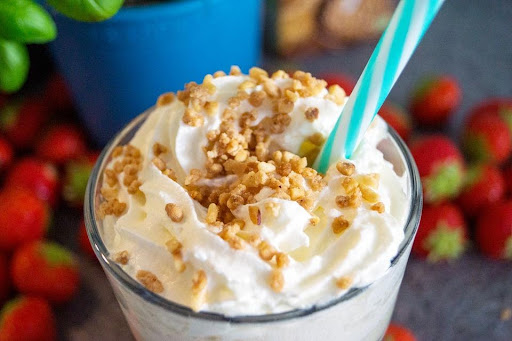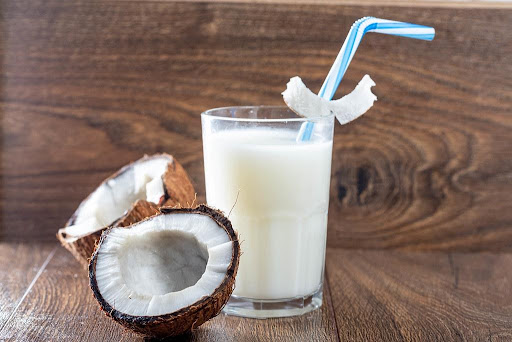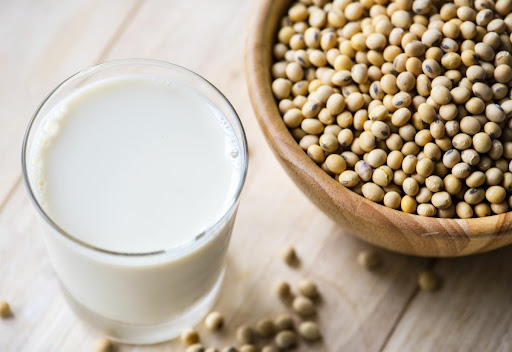- Messages
- 2,405
- Reaction score
- 1,431
- Points
- 113

Bodybuilders have long been told that milk is a must for building muscle. But is this the case? The answer is NO!
Milk, especially raw milk, contains lactose, a carbohydrate that can cause digestive problems such as cramps, diarrhea, and even bloating. In fact, many bodybuilders who consume dairy products experience side effects like these.
A recent report by The Physicians Committee For Responsible Medicine says that drinking dairy milk increases the risk of developing cancer and diabetes while lowering bone density and increasing the risk of heart disease
What’s more, if you’re trying to lose weight but still want to build muscle, dairy products are the last thing you need because they will add extra pounds to your frame.
That’s why I recommend ditching dairy milk for soy milk, coconut milk, almond milk, oat, or hemp protein powder, as they are the best plant-based protein powders on the market today. They contain a high-quality protein source that you can tolerate without adverse side effects. Below are plant-based alternatives for nearly every dairy product.
COCONUT MILK

Coconut milk is a dairy-free alternative to regular milk rich in flavor, vitamins, and minerals. It is low in calories and has no lactose or cholesterol, making it a healthy alternative to regular milk.
Coconut milk is an ideal post-workout drink, especially for vegan or lactose intolerant. It is high in fat, and most of it comes from medium-chain triglycerides (MCTs).
MCTs are broken down more quickly than other fats and are burned directly as energy instead of being stored by the body. They also encourage weight loss because they are digested more rapidly than other fats.
Coconut milk has been shown to boost metabolism by raising the body’s temperature. This helps burn fat faster while sleeping or during exercise. Here’s the nutritional information for coconut milk:
COCONUT MILK NUTRITION FACTS OF 1 CUP (240 ML) PER SERVING % DAILY VALUE
- Calories 46
- Total Fat 4 grams
- Total Carbohydrates 1gram
- Protein 0 grams
Coconut milk is also low in sugar, making it an excellent substitute for heavy cream in your coffee or tea. You may take some time to get used to the taste; however, if you aren’t used to drinking the more solid form of coconut oil, you can make coconut milk protein shake out of it.
EXAMPLES OF COCONUT MILK PROTEIN SHAKES
- Chocolate-Covered Strawberries Shake
- Tropical Dreamsicle
- Pina Colada
- Strawberry Shortcake
OAT MILK
Oat milk is made from oats and water, blended to produce the drink with a consistency similar to soy or almond milk. It is the most popular healthier alternative for dairy milk.Oat milk is a great source of fiber, containing almost twice as much fiber as regular dairy milk and antioxidants that can help lower cholesterol. It is also great calcium, vitamin D, and protein source, containing over 6 grams of protein per cup, compared to almond milk, which only contains one gram per cup.
NUTRITION FACTS FOR 1 CUP (240 ML) OF UNSWEETENED ORIGINAL OAT MILK:
- Calories 120
- Phosphorus22% of DV
- Riboflavin 46% of DV
- Fat 5 grams
- Carbohydrates 16 grams
- Fiber 2 grams
- Protein 3 grams
- 27% of the daily value (DV) for calcium
- Vitamin A 18% of DV
- Vitamin C 18% of DV).
Oat milk has been proven to be effective in helping people lose weight. It has abundant soluble fiber, which makes you feel fuller for longer and aids in digestion, helping you curb your appetite and avoid snacking between meals.
It helps lower “bad” cholesterol levels because it contains beta-glucan, decreasing cholesterol absorption. Oat milk also contains high soluble fiber levels, which boost metabolism by removing excess cholesterol from the body. This lowers the amount of LDL (bad) cholesterol circulating in your bloodstream and reduces your risk of heart diseases, strokes and heart attacks due to elevated bad cholesterol levels.
You can use this healthy drink anywhere you use regular dairy milk, but it is especially significant in making oat milk protein shakes.
EXAMPLES OF OAT MILK PROTEIN SHAKES
Here are some examples of protein shakes that can be made using oat milk:- Chocolate Peanut Butter Protein oat Shake
- Oat, Cocoa, and Banana Protein Shake
- Cinnamon Bun Protein Shake
- Chocolate Mint Protein Shake
ALMOND MILK
Almond milk is created from ground almonds mixed with water. It has a mild, nutty flavor and a creamy texture similar to soy or coconut milk.It contains vitamins and minerals, which can vary depending on the brand. Almonds are also a rich source of protein and fiber. These help build muscle and reduce cholesterol while also boosting your immune system.
Almond milk is naturally lower in calories than other milk varieties. It has no saturated fat, making it a great option to replace your regular milk without worrying about the health of your body.
UNSWEETENED ALMOND MILK NUTRITION FACTS OF 240 ML (8 OUNCES) AMOUNT PER SERVING CONTAINS:
- Calories: 41 grams
- Fat: 2.5 grams
- Protein: 1 gram
- Carbohydrates: 2 grams
- Fat: 3 grams
- Vitamin E 50% of DV
ALMOND MILK PROTEIN SHAKES
Here are protein shakes that you can make using almond milk:- Banana Peanut Butter Shake
- Cherry Vanilla Protein Shake
- Almond Joy
- Almond Milk Banana Smoothie
- Blueberry Vanilla Protein Shake
- Almond Milk Coffee Smoothie
- Almond Chocolate Strawberry Protein Shake
SOY MILK

There are many types of soy milk, but the two most popular are total fat and low fat. Soy milk is alternative milk that is naturally high in protein and contains all essential amino acids. By using soy milk instead of dairy, you can receive an increase in protein while still maintaining a low-calorie diet.
ONE CUP OF SOY MILK (240ML) CONTAINS:
- calories 105
- protein 6 grams
- fat 4 gams
- Vitamin B12 34%
- carbohydrates 12 grams of DV
- phosphorus 10% of DV
- calcium 30% of DV
- magnesium
- zinc
Soy milk is rich in the amino acid leucine. After a strenuous workout session, this essential amino acid helps improve muscle growth and repair damaged tissues. The presence of leucine triggers muscle protein synthesis and reduces muscle breakdown during exercise sessions. Soy milk can also help improve muscle contraction efficiency while reducing post-exercise muscle soreness.
It is also rich in isoflavone, lowering blood pressure and “bad” cholesterol levels.
It’s important to note that not all soy milk is not created equal. Some companies use a lot of sugar in their products, which increases the calorie count and increases the risk of heart diseases diabetes. It’s best to look for a low-sugar version with “unsweetened” written on the label.
SOY MILK PROTEIN SHAKES
Examples of protein shakes made with Soy Milk include:- Banana Soy Protein Shake
- Coffee Soy Protein Shake
- Soy Chocolate Protein Shake
- Soy Banana-Berry Shake
- Banana-acai-blueberry smoothie
- Vanilla bean green tea
HEMP MILK
Hemp milk is a non-dairy and gluten-free alternative to regular milk. It is high in protein, vitamins A and D, and essential fatty acids.Hemp milk is made from grinding hemp seeds into a fine powder and mixing the powder with water. The resulting liquid is then strained to produce a creamy white liquid with a nutty, slightly grassy taste and contains all the essential amino acids vital for the growth of muscles.
It also contains Omega-3 fatty acids, which are essential nutrients. You get both these nutrients in hemp seed, and they can help you build muscles faster and more robust.
ONE CUP OF HEMP MILK CONTAINS:
- Calories 60
- Carbs 0
- Iron 15% of DV2
- Proteins 3g
- Fat 5g
- Calcium 20% of DV
- Magnesium 15% of DV
Hemp Milk Protein Shakes
There are different protein shakes that one can make using hemp milk. They include:
- Frozen Strawberry Hemp Shake
- Banana Protein Shake
- Tropical Green Smoothie
- Mint Chocolate Chip Protein Shake
- Tropical Mango Hemp Shake
- Tofu Hemp Shake
THE NUTRITIONAL BENEFITS OF GOING DAIRY FREE
Development of strong teeth and bones– Unlike dairy milk, almond milk is an excellent source of calcium. It has about 30% of the daily value of calcium per cup. This mineral is essential for strong bones and teeth.Keeping skin clear and supple– Almond milk contains Vitamin E that helps keep your skin looking smooth and supple. It also helps maintain proper blood flow in the body, which improves overall health. Vitamin E may also protect against heart disease and cancer.
Weight loss– dairy milk contains saturated fat that causes an increase in weight. By cutting out dairy and replacing it with more wholesome alternatives, you can improve your health and lose weight.
Reduce digestion issues- Dairy products often cause digestive distress because they contain lactose and casein that are difficult to digest without the aid of an enzyme called lactase. By cutting them out, you will reduce digestion problems.
Lower cholesterol levels- giving up dairy products reduces your intake of saturated fat, which can help to lower your cholesterol levels, which will help prevent heart disease, and reduce blood pressure by about 2/3 of a point to those who have high blood pressure
COMPARISON OF EACH ALTERNATIVE MILK TO REGULAR MILK
Now that we have looked at the nutritional benefits of going dairy-free, let’s compare each alternative milk to regular milk. The nutritional evidence is based on 1 cup (8 ounces) obtained from the USDA’s nutrient database and the websites of a few prominent brands.| Nutrients | Regular Milk(whole milk) | Coconut milk | Oat Milk(original) | Almond milk(pure) | Soy Milk | Hemp Milk |
|---|---|---|---|---|---|---|
| Calories | 150Cal | 420Cal | 91.2Cal | 30Cal | 103.2Cal | 60Cal |
| carbs | 12g | 6g | 19g | 1g | 11.8g | 20g |
| Proteins | 8g | 3g | 2g | 1g | 6.2g | 3g |
| Fat | 8g | 15g | 1.5g | 2.5g | 3.5g | 5g |
| Fiber | 0 | 0 | 2g | <1g | <1g | 1g |
| Calcium | 28% | 0 | 25% | 30% | 20% | 30% |
| Phosphorus | 21% | 6% | ||||
| Potasium | 9% | 6% | 8% | 2% | 7% | 8% |
| Vitamin D | 31% | 10% | 31% | 10% | 15% | 20% |
| Vitamin E | 20% | 25% |

